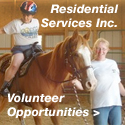The Lost Art of Rest
“Drink your tea slowly and reverently, as if it is the axis on which the world earth revolves – slowly, evenly, without rushing toward the future.” –Thich Nhat Hanh
By: Jeff Mortimore, RSI Community Connector
Last week I heard the term “caution fatigue” for the first time. Caution fatigue has been observed in our everyday life, like when you ignore an alarm of some sort and don’t take it seriously because you have heard it many times before. Its onset can be caused by chronic stress, reaching our emotional capacity, and decreased sensitivity to what’s going on around us.
When the COVID-19 pandemic began to move more directly into our lane, we reacted with immediate preventative measures. However, as time went on, we started to get used to these abrupt changes and it became part of our daily routines. Caution fatigue started to creep in when the threat became less personal, although still disruptive.
Stress, at various levels, affects all of us. It sometimes feels like we are all carrying a piano on our back. This past weekend, I finally found the cure to all of our ills….REST. Okay, calling this piece about rest as lost art is probably a stretch. However, I believe that many people don’t do enough of it. The lack of true rest drains us to the point where we’re never really fully energized, fully present, or fully awake. It means our relationships start to lack energy and connection. It means we have a harder time feeling joy. I have caught myself taking breaks or finishing my workday, only to get on my phone or laptop for mindless drifting. It feels like the thing I want to do…when I have rest time. But, it’s not really rest. I don’t feel refreshed afterward, only more depleted.
So, what does true rest really look like? Further, what are the factors that keep us from enjoying this simple pleasure? For me, rest can feel unproductive. For someone like me who is dedicated to experiences and outcomes, this is the antithesis of a productive practice. We all have our own barriers, like time management, deadlines, emails, and other responsibilities that hold us back from truly resting. But the bottom line is that rest is critical to our well-being and productivity.
My new fascination with rest started early in the pandemic. I could see that my anxiety level was on the rise and I was terribly distracted by the daily updates from the White House pandemic team. So, I downloaded a meditation app on my phone and committed to a more disciplined meditation practice. This daily commitment opened the door to a more profound look at my mental state and starting my day by meditating became one of my better habits. Eventually, I wanted more. It may seem counterintuitive, but meditation enhanced my awareness and work focus. The simple act of closing my eyes and doing nothing was a great mental and physical break.
Of course, there are many other ways to achieve rest. Getting outside, connecting with nature, pulling weeds, or being fully present with a simple non-work activity like enjoying a cup of tea. This is a time to focus only on the activity and to drown out the nagging tasks, work topics, and personal struggles. The key is to make this the ONE thing you are doing. A single task. Give the activity your full focus. Give yourself time and space, savor the moment, and notice all of the sensations involved with the experience. If you find that your mind takes you in other directions, be kind to yourself and be curious as to why that thought flits into view. Then, simply start over. Rest requires discipline, too!
Are you tired? Are you craving rest or an escape? If so, give yourself a few moments of true rest. Not by checking your phone, not reading or watching online feeds, but true rest. Ask yourself this throughout the day. You might find that you need more true rest than you realize.
Learn more about Jeff’s work at RSI on our Community Connections page.



